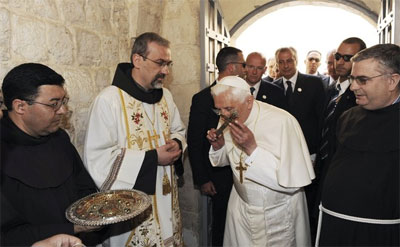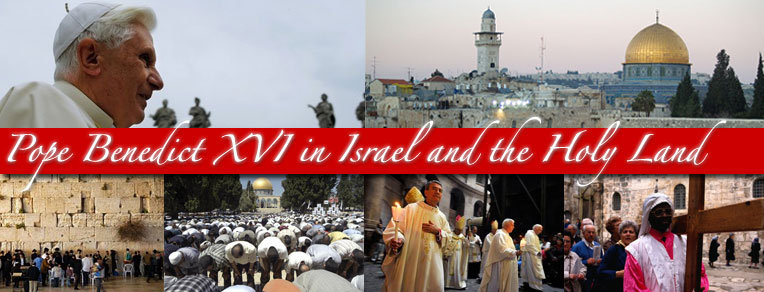skip to main |
skip to sidebar
Pope Benedict visits The Upper Room, Jerusalem
When Jesus knew that his hour had come to depart from this world to the Father, having loved his own who were in the world, he loved them to the end” (Jn 13:1). The Upper Room recalls the last supper of our Lord with Peter and the other apostles and invites the Church to prayerful contemplation. In this vein we gather together, the Successor of Peter with successors of the apostles, in this same place where Jesus revealed in the offering of his own body and blood, the new depths of the covenant of love established between God and his people. In the Upper Room the mystery of grace and salvation, of which we are recipients and also heralds and ministers, can be expressed only in terms of love. Because he has loved us first and continues to do so, we can respond with love (cf. Deus Caritas Est, 2).

Our life as Christians is not simply a human effort to live the demands of the Gospel imposed upon us as duties. In the Eucharist we are drawn into the mystery of divine love. Our lives become a grateful, docile and active acceptance of the power of a love which is given to us. This transforming love, which is grace and truth (cf. Jn 1:17), prompts us, as individuals and communities, to overcome the temptation to turn in upon ourselves in selfishness or indolence, isolation, prejudice or fear, and to give ourselves generously to the Lord and to others. It moves us as Christian communities to be faithful to our mission with frankness and courage (cf. Acts 4:13). In the Good Shepherd who lays down his life for his flock, in the Teacher who washes the feet of his disciples, you find, my dear brothers, the model of your own ministry in the service of our God who promotes love and communion.
-- Excerpt,
Pope Benedict XVI: Regina Cœli prayer with the Ordinaries of the Holy Land in the Upper Room in Jerusalem (May 12, 2009)











No comments:
Post a Comment